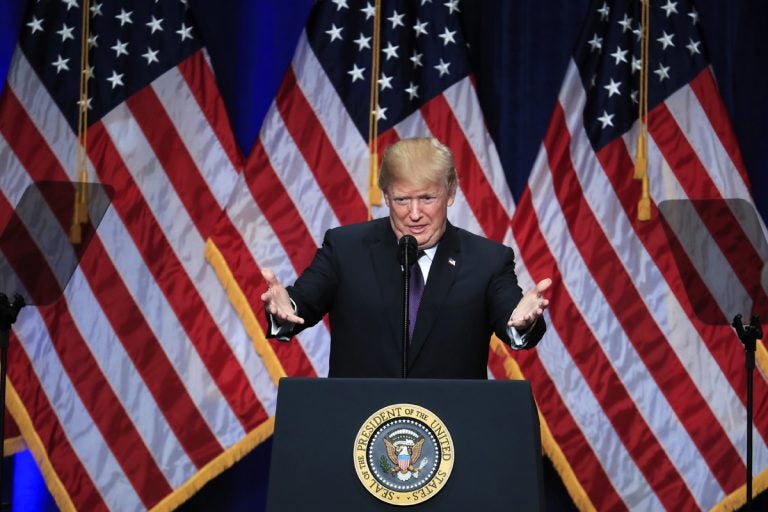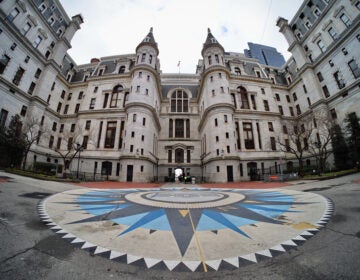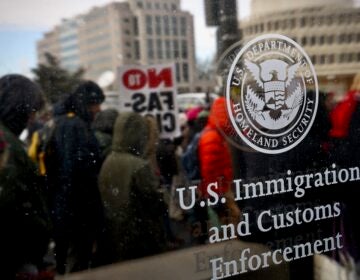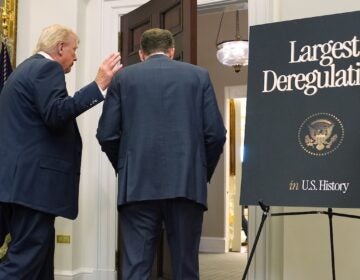The real scandal: Case officer Putin and his American asset
How horrific to watch a weak president deliver a national security speech without mentioning Russia's invasion of our '16 election or what he's doing to prevent more of it.

President Donald Trump speaks and lays out a national security strategy that envisions nations in perpetual competition, reverses Obama-era warnings on climate change, and de-emphasizes multinational agreements, in Washington, Monday, Dec. 18, 2017. (AP Photo/Manuel Balce Ceneta)
How horrific it was yesterday to watch a weak president deliver a national security speech, yet never once mention Russia’s unprecedented invasion of our ’16 election, nor to mention what concrete steps are being taken to prevent similar penetrations in the ’18 midterms and beyond.
As James Clapper, the former director of national intelligence, remarked yesterday, Trump’s subservience to Russia shows us “what a great case officer Vladimir Putin is. He knows how to handle an asset, and that’s what he’s doing with the president.” Reread that quote, then ask yourself when was the last time — like, ever? — that an American intelligence veteran said anything so condemnatory about an American president.
But he’s on target. It’s almost beside the point whether Trump and his people directly “colluded” with Russia in the latter’s cyber-invasion; let’s leave that issue to Robert Mueller. The scandal now beyond dispute is that Trump still refuses to accept the intelligence community’s consensus, endorsed by key Republicans on Capitol Hill, that Russia hacked the election on his behalf; that he relentlessly sucks up to the hacker-in-chief; and that he shows little interest in confronting this growing threat to our democratic process.
He spoke yesterday about global threats to America — timed with the release of his National Security Strategy, a document that’s periodically updated by the executive branch — and, not surprisingly, Russia got off easy. The document itself briefly mentions that Russia and other countries “are using information tools in an attempt to undermine the legitimacy of democracies” and that our “public and private sectors” need to “defend our way of life,” but it says nothing about 2016, nor does it recommend any specific steps to thwart future Russian invasions. And Trump, in his speech, made no references to those paltry document passages — aside from a vague promise to “develop ways to counter those who use new domains.”
This display of weakness was surely no surprise to Texas Republican Congressman Michael McCaul, chairman of the House Homeland Security Committee. McCaul said over the weekend that Trump needs to confront Putin “more forcefully,” that he needs to voice “outright condemnation” about the ’16 election hacking. McCaul is upset that Trump consistently refuses to do so: “I think there is a lot of, for whatever reason, avoidance of the issue … This threat is ever evolving and getting worse by the day.”
And if you’re looking for a disturbingly deep dive into Trump’s un-American avoidance, I recommend this investigative story, posted last Thursday but quickly buried in the usual 24/7 news avalanche. The key finding “based on interviews with more than 50 current and former U.S. officials,” many with ties to Trump:
“Nearly a year into his presidency, Trump continues to reject the evidence that Russia waged an assault on a pillar of American democracy and supported his run for the White House. The result is without obvious parallel in U.S. history, a situation in which the personal insecurities of the president — and his refusal to accept what even many in his administration regard as objective reality — have impaired the government’s response to a national security threat. The repercussions radiate across the government.
“Rather than search for ways to deter Kremlin attacks or safeguard U.S. elections, Trump has waged his own campaign to discredit the case that Russia poses any threat … Trump has never convened a Cabinet-level meeting on Russian interference or what to do about it, administration officials said. Although the issue has been discussed at lower levels at the National Security Council, one former high-ranking Trump administration official said there is an unspoken understanding within the NSC that to raise the matter is to acknowledge its validity, which the president would see as an affront.”
Intelligence officials, worried about Russia’s growing capacity for more meddling, have staged “impromptu interventions” with Trump, to no avail. They’re loathe to even mention Russia-related intelligence during their White House briefings: “Current and former officials said that his daily intelligence update — known as the president’s daily brief, or PDB — is often structured to avoid upsetting him.” And Trump’s senior advisers are loathe to enter the Oval Office with sensitive Russia news, because they don’t want Trump to “erupt.” Their rule is “Don’t walk that last 5 1/2 feet.”
That’s right, folks: The Russian threat to our democracy cannot be shared with the toddler, lest he throw tantrums. Our national security is hostage to an eggshell ego. If a President Hillary Clinton ever acted that way, she’d already be enmeshed in Republican impeachment proceedings, and deservedly so.
Which brings us back to Michael McCaul, the House Republican who chairs the homeland security panel: “When you look at the intelligence, it is very clear the attribution goes directly to the Kremlin … Russia is not going to stop their bad behavior unless there are consequences to it. I haven’t seen any consequences (from Trump), and I fully anticipate in 2018, and certainly the next presidential election, that they’ll be trying the same thing. And I think we need to be prepared for that.”
But we’re not prepared. Trump and his enablers can trash Robert Mueller all they want, seeking to block or impugn his probe, but asset Trump’s ongoing subservience to his case officer, and his failure to take all possible steps to guard against further electoral attacks, is the scandal that will live in infamy.
—
Presidential job approval in December of their first year, courtesy of Gallup:
- George W. Bush, 86 percent
- John F. Kennedy, 77 percent
- George H. W. Bush, 71 percent
- Dwight D. Eisenhower, 69 percent
- Richard Nixon, 59 percent
- Jimmy Carter, 57 percent
- Barack Obama, 54 percent
- Bill Clinton, 54 percent
- Ronald Reagan, 49 percent
- Donald Trump, 35 percent
WHYY is your source for fact-based, in-depth journalism and information. As a nonprofit organization, we rely on financial support from readers like you. Please give today.




